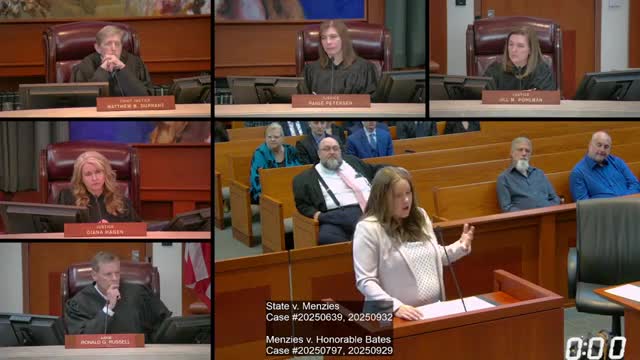Court Weighs Competency Challenges in Menzies Case Amid Prolonged Evaluation Process
August 21, 2025 | Utah Supreme Court, Utah Judicial Branch, Utah
Thanks to Excel Chiropractic and Scribe from Workplace AI , all articles about Utah are free for you to enjoy throughout 2025!

This article was created by AI using a video recording of the meeting. It summarizes the key points discussed, but for full details and context, please refer to the video of the full meeting. Link to Full Meeting
The discussion began with an emphasis on the statutory timeline, which stipulates a 60-day period for evaluations and reports from the Department of Human Services (DHS), followed by a 15-day window for a hearing. However, the timeline in Mr. Menzies' case extended significantly beyond these parameters, raising concerns about the implications of such delays. Legal representatives argued that the extended timeframe—spanning over a year—contradicted the statute's intent, which aims for timely assessments of competency.
Key points of contention included the determination of Mr. Menzies' competency, particularly following evaluations conducted on June 27 and June 30, where he reportedly struggled to articulate the charges against him. This was highlighted as a critical moment indicating a decline in his mental capacity. Further testimony from a witness, Stephanie Callahan, noted significant changes in Mr. Menzies' condition, particularly an incident on July 8, which underscored his deteriorating awareness.
The court also examined the implications of Mr. Menzies' progressive disease, which is characterized by a continuous decline in cognitive function. Legal representatives argued that the nature of his illness complicates the determination of competency, as his condition is subject to rapid changes. This raised questions about the potential for ongoing petitions regarding competency, given the unpredictable trajectory of his health.
The justices engaged in a thorough examination of the legal definitions surrounding "determination" and whether it should be interpreted as the issuance of the June 6 order declaring Mr. Menzies competent. The discussion highlighted the challenges faced in balancing statutory requirements with the realities of evaluating a patient with a progressive illness.
In conclusion, the meeting underscored the complexities involved in competency determinations, particularly in capital cases where the stakes are high. The court's deliberations revealed a need for clarity in statutory interpretation and a recognition of the unique challenges posed by progressive diseases in legal contexts. The outcome of these discussions will likely influence future cases involving competency evaluations and the timelines associated with them.
Converted from State v. Menzies, Case #20250639, 20250932 and Menzies v. Hon. Bates, Case #20250797, 20250929 audio file meeting on August 21, 2025
Link to Full Meeting
Comments
View full meeting
This article is based on a recent meeting—watch the full video and explore the complete transcript for deeper insights into the discussion.
View full meeting

